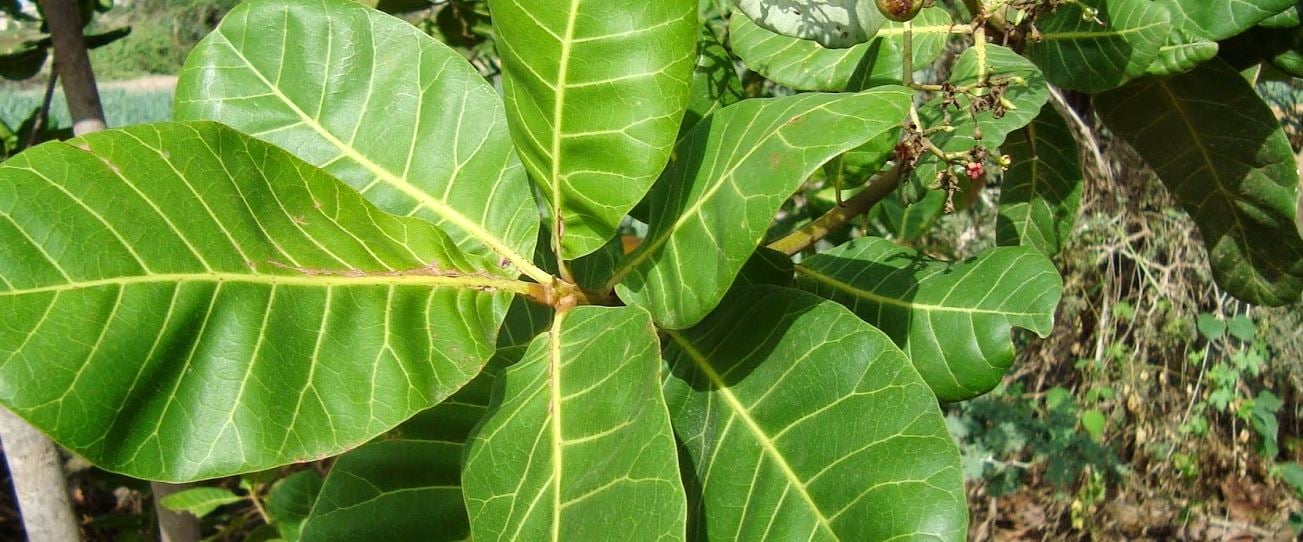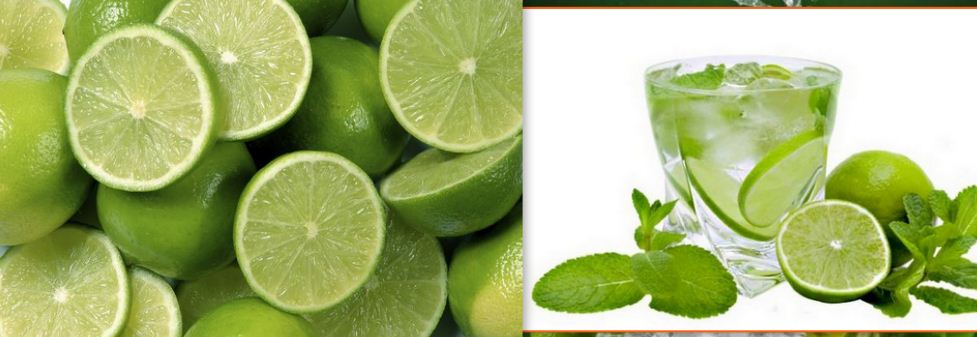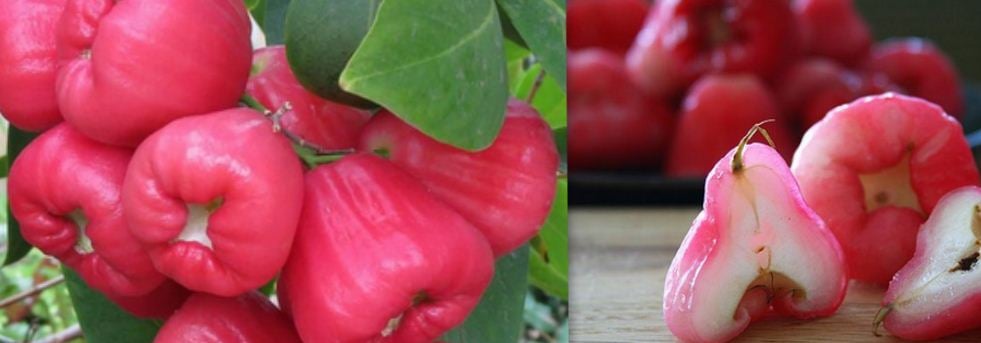Incredible Health Benefits of Cashew Leaf: A Comprehensive Guide

Cashew leaves, scientifically known as Anacardium occidentale, are cashew tree leaves. These tropical evergreen trees are native to northern Brazil, Vietnam, India, Ivory Coast, Nigeria, and the Philippines.
Cashew leaves are oval, with noticeable veins and midribs, and have a tangy, astringent taste. These leaves have been utilized for medicinal purposes in traditional medicine for a prolonged duration to cure diverse ailments. These useful leaves have numerous benefits in recent studies.
15 Health Benefits of Cashew Leaf: A Comprehensive Guide
Cashew leaf is a powerful and versatile herb that offers numerous health benefits. Discover the health benefits of consuming cashew leaves through this comprehensive guide, including their effects on inflammation reduction and blood sugar regulation. The following guide will outline 15 health benefits of cashew leaves to help you stay healthy.
1. Oral Health
a. Cashew Leaves as Toothpaste
In many parts of the world, cashew leaves are chewed and used as a natural toothpaste. Their antimicrobial properties help to eliminate harmful bacteria, preventing tooth decay and gum diseases. The astringent taste of cashew leaves also helps to freshen the breath.
b. Treatment for Toothaches and Gum Problems
Cashew leaves contain anti-inflammatory properties that relieve toothaches and gum inflammation. Traditionally, a paste made from cashew leaves has been applied directly to the affected area to alleviate pain and swelling.
c. Mouthwashes
Cashew leaves are also essential in making mouthwashes that help to maintain oral hygiene. Cashew leaves' antimicrobial and antiseptic properties make them an effective natural alternative to commercial mouthwashes without harmful chemicals and alcohol content.
2. Antimicrobial Potency
a. Inhibition of Human Pathogens
Ethanolic extract from cashew leaves inhibits the growth of human pathogens, providing a natural defense against infections. This antimicrobial potency can be beneficial for preventing and treating various bacterial, fungal, and parasitic diseases.
b. Wound Healing Properties
Thanks to their anti-inflammatory and antimicrobial properties, Cashew leaves have been vital in treating wounds, burns, and skin irritations for centuries. They can help stimulate healing, reduce inflammation, and prevent infections.
3. Antioxidant-Rich
Cashew leaves have potent antioxidants like cardanols, anticardic acids, and melodies. The damaging effects of harmful molecules can be countered by antioxidants, protecting cells in the body. Severe health conditions such as cancer, cardiovascular issues, and diabetes are associated with these things.
a. Cancer and Tumor Treatment
The antioxidants found in cashew leaves have shown potential in treating cancer and tumors. You can halt cancer cells from spreading and even eliminate specific types of cancer using certain substances, according to recent findings by researchers.
b. Prevention of Chronic Diseases
The antioxidants in cashew leaves can help thwart long-term diseases by reducing stress and inflammation. This activity can improve your chances of avoiding diabetes, heart disease, or stroke.
4. Cholesterol Control
Cashew leaves contain an ideal fat profile for controlling cholesterol and triglycerides, lowering the risk of heart disease. The fiber and antioxidants in cashew leaves also contribute to reducing cholesterol levels.
a. Phytosterols
Cashew leaves are a natural source of phytosterols that lowers cholesterol levels. These plant compounds are similar to those chemically added to certain food products to improve their cholesterol-lowering effects.
b. Tocopherols and Squalene
Cashew leaves also contain tocopherols and squalene, which are antioxidant plant chemicals that can help to reduce the risk of heart disease. These compounds work together with the phytosterols to support the cardiovascular system.
5. Antidiabetic Activities
Cashew leaves are traditional remedies for treating diabetes mellitus in many tropical countries. Recent studies have shown that cashew leaves demonstrate significant antidiabetic potential, making them a valuable addition to the management of diabetes.
a. Blood Sugar Regulation
Cashew leaves are high in magnesium, which can help regulate blood sugar levels through insulin. People who have diabetes find it advantageous as it stabilizes their blood sugar levels and hinders possible issues.
b. Comparison to Standard Diabetes Medications
In a study comparing the antidiabetic activity of cashew leaf extracts to the standard drug Pioglitazone, cashew leaves demonstrated a similar effect in reducing blood sugar levels in diabetic rats, suggesting that cashew leaves could be a natural alternative to conventional diabetes medications.
6. Bone and Nerve Health
a. Magnesium Content
Cashew leaves are high in magnesium, which is necessary to properly develop bones, muscles, tissues, and organs. Magnesium maintains blood pressure, immunity, neuron function, and bone strength.
b. Calcium and Phosphorus
Cashew leaves also contain calcium and phosphorus, essential minerals for maintaining strong bones and teeth. These minerals and magnesium work together to ensure proper bone development and prevent conditions like osteoporosis.
7. Immune System Boost
The zinc content in cashew leaves is essential for the immune system's defense against microbial infections and wound healing. Consuming cashew leaves can help strengthen the immune system, making it more effective in fighting infections and diseases.
a. Pregnancy and Fetal Development
Zinc is also crucial during pregnancy for the baby's growth and development. Consuming cashew leaves can help to ensure adequate zinc intake, promoting a healthy pregnancy and supporting the baby's development.
b. Antiviral Properties
Consumption of cashew leaves or their derivatives may reduce the risk of contracting viral infections. To combat sicknesses such as the flu and colds, keep your body strong, particularly during the cold and flu season.
8. Rich in Vitamins
Cashew leaves contain significant amounts of vitamins A, B, and C essential for overall health and well-being.
a. Vitamin A
Maintaining healthy eyes, skin, and immune systems requires an adequate intake of Vitamin A. Including cashew leaves as a nutritious component in your food intake can prove beneficial owing to the significant vitamin they possess.
b. Vitamin B
Cashew leaves are a good source of several B vitamins for energy production, brain function, and synthesizing hormones and neurotransmitters. Including cashew leaves in your diet can help to support mental health and prevent conditions like depression and anxiety.
c. Vitamin C
Adequate Vitamin C intake is required to keep ourselves healthy and prevent health conditions like heart ailments, cancer, and the common cold. Cashew leaves are a natural source of vitamin C, making them a valuable immune system booster.
9. Cardiovascular Health
You can improve your heart health through the beneficial effects of cashew tree leaves. Antioxidants and healthy fats found in nuts contribute to improving heart health. Moreover, they assist in lowering unhealthy cholesterol in the body. If you desire a healthy heart, then it is recommended that you eat them.
a. Blood Pressure Regulation
Magnesium found in cashew leaves can help maintain healthy blood pressure levels. Cashew leaves will limit your chance of developing cardiovascular conditions or high blood pressure.
b. Prevention of Atherosclerosis
The secretion found in cashew leaves inhibits the development of atherosclerosis. Impaired blood flow can result from the buildup of harmful substances in the blood vessels. Furthermore, it can escalate the possibility of developing a heart attack or stroke. Preventing this from happening can be facilitated with the aid of the elements contained in cashew leaves.
10. Digestive Health
Cashew leaves contain fiber essential for maintaining a healthy digestive system. Consuming cashew leaves can help to prevent constipation, promote regular bowel movements, and support overall digestive health.
a. Prebiotic Effects
Cashew leaves have fibers that promote the well-being of beneficial stomach bacteria and can facilitate digestion, augment immunity, and foster mental health.
b. Weight Management
Cashew leaves can also help with weight management, as their fiber content can help to promote a feeling of fullness, reducing the risk of overeating. Including cashew leaves in your diet can support healthy weight loss and maintenance.
11. Skin Health
Cashew leaves are traditionally excellent remedies to treat various skin conditions, including burns, wounds, and irritations. Their antioxidant and anti-inflammatory properties can help promote healthy skin and support healing.
a. Treatment of Acne
Cashew leaves can be used as a natural treatment for acne, as their antimicrobial and anti-inflammatory properties can help to reduce inflammation and prevent the growth of acne-causing bacteria.
b. Anti-Aging Benefits
The active ingredient found in cashew leaves that fights skin issues can hinder the process of aging. Including cashew leaves in your diet is an effective way to prevent skin aging and maintain wrinkle-free skin.
12. Respiratory Health
Using cashew leaves as natural remedies can alleviate breathing difficulties such as asthma, bronchitis, and coughs. The implementation can decrease swelling and battle against bacterial infection, enhancing breathing capability and removing various related indications.
a. Asthma Relief
Consuming cashew leaves can help relieve asthma symptoms, as their anti-inflammatory properties can help reduce airway inflammation and improve lung function.
b. Treatment of Coughs and Colds
Cashew leaves can also be used as a natural remedy for coughs and colds, as their antimicrobial properties can help to eliminate the pathogens responsible for these infections. Their anti-inflammatory properties can also help to soothe irritated airways and reduce coughing.
13. Liver Health
Cashew leaves support liver health by protecting against oxidative stress and promoting detoxification processes.
a. Antioxidant Protection
The antioxidants in cashew leaves can help protect the liver from oxidative stress, leading to liver damage and disease. Consuming cashew leaves can help to maintain healthy liver function and prevent conditions like fatty liver disease and cirrhosis.
b. Detoxification Support
The presence of cashew leaves can aid in removing toxins from the liver in your body, which is advantageous for those with liver complications or individuals who prioritize their wellness.
14. Kidney Health
Cashew leaves to support kidney health by promoting the elimination of waste products and preventing the formation of kidney stones.
a. Diuretic Effects
Consuming cashew leaves can help to promote proper kidney function by acting as a natural diuretic, increasing urine production, and helping to eliminate waste products from the body.
b. Prevention of Kidney Stones
The magnesium content in cashew leaves can help prevent kidney stone formation by inhibiting the crystallization of calcium oxalate, one of the most common types of kidney stones. Including cashew leaves in your diet can help to maintain healthy kidneys and reduce the risk of kidney stones.
15. Eye Health
Vitamin A present in cashew leaves can maintain the health of our eyes and prevent cataracts and age-related macular degeneration.
a. Antioxidant Protection for the Eyes
The antioxidants in cashew leaves can help protect the eyes from oxidative stress and free radical damage, which can contribute to developing eye diseases and vision loss.
b. Maintenance of Healthy Vision
Consuming cashew leaves can support healthy vision by providing essential nutrients like vitamin A, which is necessary to maintain the retina and prevent vision problems.
Potential Side Effects of Consuming Cashew Leaves
The effects of ingesting cashew leaves need to be better understood. Eating cashews or other nuts is not advisable if you are allergic to them, as this might result in a harmful reaction.
Feeling unwell, experiencing stomach disturbances, or throwing up are possible outcomes of consuming too much cashew leaf extract. It is proper to seek medical advice before using cashew leaves, particularly if you have any health issues.
Kidney stones are set off by oxalates in cashew leaves, particularly in individuals prone to the condition. If you have had kidney stones before, don't eat cashew leaves. Before taking any action, consult with your physician.
Pregnant or breastfeeding women should also avoid consuming cashew leaves, as there is limited research on their safety during pregnancy and lactation. While cashew leaves offer numerous health benefits, drinking them as teas in moderation and speaking to a healthcare professional to avoid potential adverse effects is essential.
Is Cashew Leaves Poisonous?
Raw cashew nuts and the shell surrounding the cashew nut contain a toxin called urushiol, which can cause skin irritation similar to poison ivy when mishandled. However, cashew leaves do not contain urushiol and are safe for consumption.
Cashew leaves work as traditional medicine for their medicinal properties and as a culinary herb in many countries.
It is advisable to exercise care when ingesting cashew leaves and limit the quantity while ensuring they are neat and cooked sufficiently. Like any other food, an excess intake of any other can harm your health; therefore, you should consume it in moderation. When attempting new dishes or diets, particularly if you have worries or a history of food intolerance, it is necessary to speak with a healthcare professional or someone knowledgeable about food.
The Best Ways to Prepare Cashew Leaves for Consumption
You can use Cashew leaves which are versatile ingredients in various ways. Here are some popular methods of preparing cashew leaves:
1. Steaming: Use cashew leaves by cooking and serving them with your meal or salad. Soften the leaves by washing and steaming them in a basket for 5 to 10 minutes.
2. Stir-frying: Sauté vegetables with ginger, garlic, and other vegetables on a pan to make a yummy and healthy meal. Heat a wok or frying pan by pouring some oil into it. Soften the cashew leaves by cooking them for a short time.
3. Tea: You can brew cashew leaves into a tea by steeping a handful of leaves in hot water for 5-10 minutes. This tea has numerous health benefits.
4. Smoothies: Add cashew leaves to smoothies and other fruits and vegetables for a nutrient-packed drink.
5. Pesto: You can prepare a tasty and exclusive pesto sauce from cashew leaves. Create a smooth blend of cashew leaves with garlic, olive oil, parmesan cheese, and nuts.
Opt for cashew leaves, as they tend to wilt rapidly. Newly harvested cashew leaves can be kept fresh in the refrigerator for seven days by storing them in a plastic bag.
In conclusion, cashew leaves offer many health benefits, from supporting oral health to maintaining healthy vision. These valuable leaves can contribute to your vitality and promote a sense of wellness when consumed as a part of your diet. Incorporate them into your well-rounded meals.




